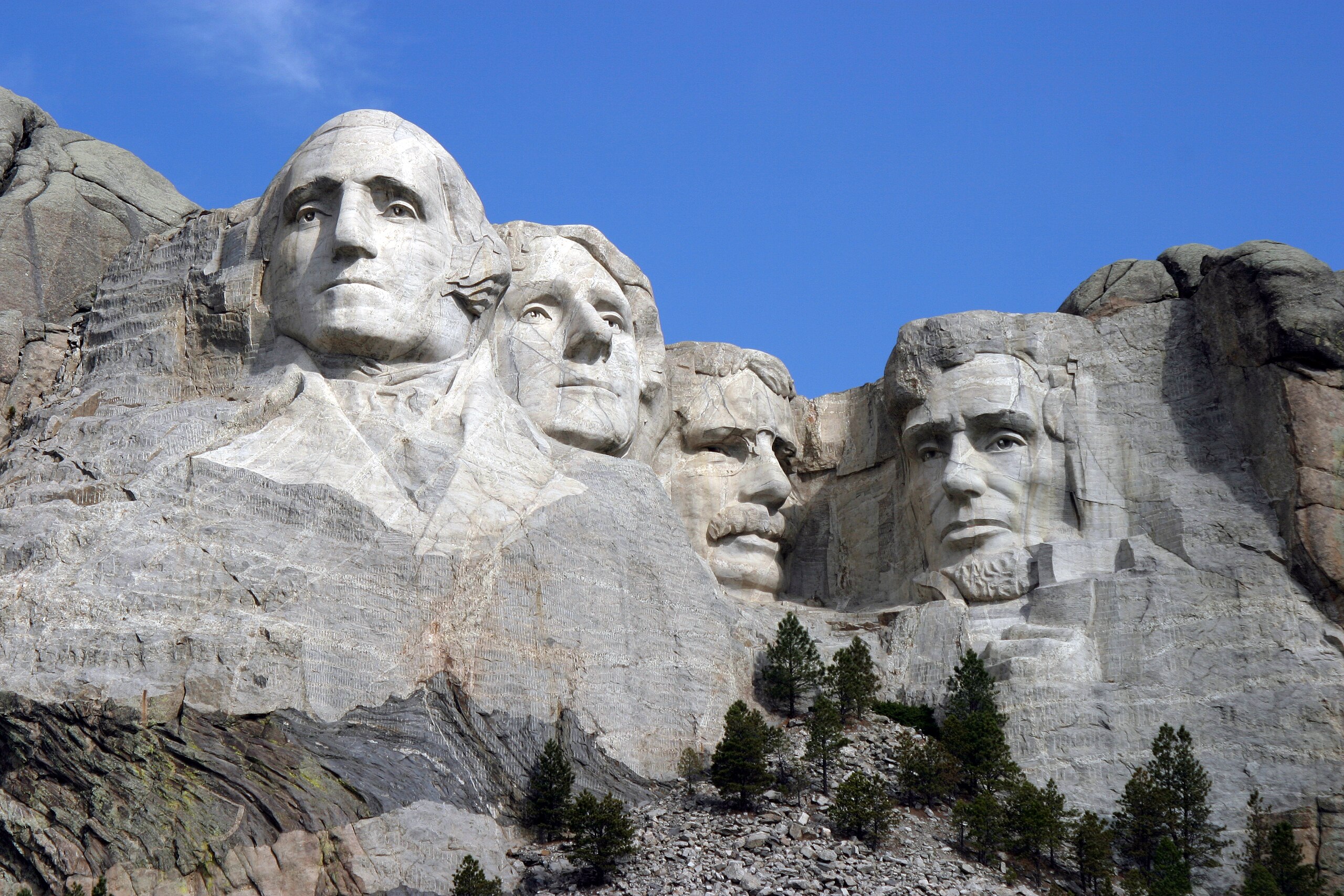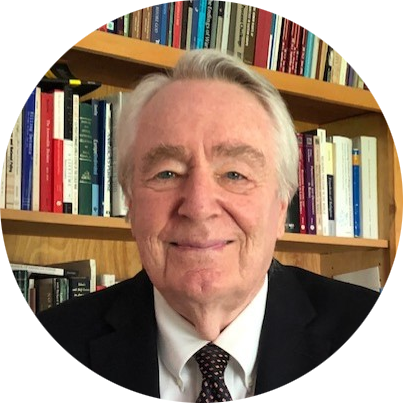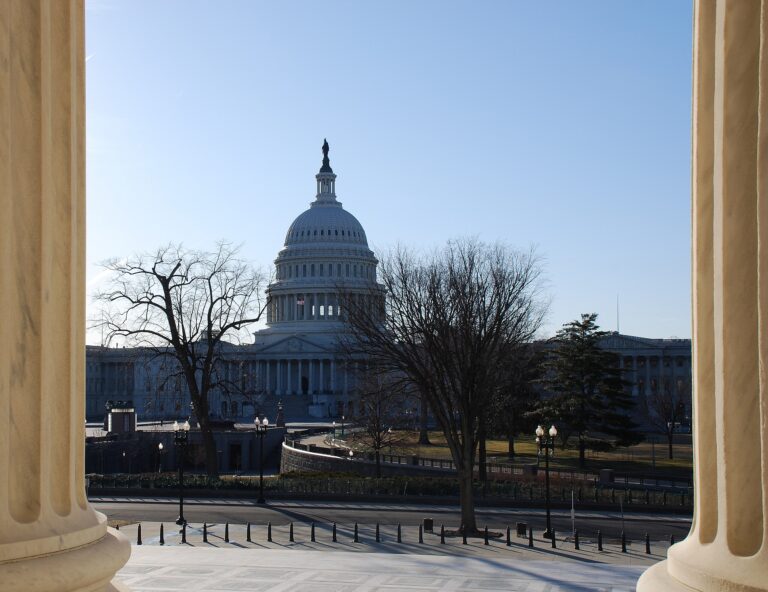
God & Country: A Look at White Christian Nationalism that Both Enlightens and Disappoints
David Little
Mount Rushmore, USA by Dean Franklin (CC BY 2.0).
Rob Reiner’s recent movie, God & Country is, to be sure, a compelling presentation of the character and influence of white Christian nationalism and a powerful reminder of the dire threat the movement represents for American political and social life in this portentous presidential election year. At the same time, the movie only begins to hint at the kind of response that is called for, and in doing so now and then misleads.
Though it has been criticized for not providing a clear definition of white Christian nationalism, God & Country, in fact, graphically depicts and illustrates, over the course of the film, the key defining characteristics of the movement. These begin with the belief that America was officially founded on “Judeo-Christian” biblical laws and teachings, and that present-day American laws and policies should be derived from and explicitly based on those sources. “We are going to impose Christian rule in this country,” declares Pastor Rick Wiles, and his sentiments are echoed in a Prayer Declaration, solemnly recited before a huge throng of enthusiastic adherents: “Whereas our country was founded on Judeo-Christian laws,” and “Whereas we, the church, are God’s governing body on earth, and…have the legal power from heaven,…we now exercise our authority.”
Denouncing legal separation of religious and political authority is a central conviction of Christian nationalists.
God & Country goes on in considerable detail to demonstrate that Christian nationalism is, above all, a carefully designed, well-organized, and extravagantly well-funded political movement intent on gaining dominant political power. The film documents at length the organizational aggressiveness of the movement, including a surprisingly candid description by former Christian Coalition leader Ralph Reed, of the intrusive techniques employed to track and influence voters, as well as arresting displays of the unabashed use of churches and church publications as a means of motivating voters. Beyond that, it is particularly effective in exposing the power of the internet and mass media as methods for inspiring devotion and mobilizing political action. Kristin Kobes du Mez, a Christian historian and author of the widely read and noted Jesus and John Wayne: How White Evangelicals Corrupted a Faith and Fractured a Nation, gives a revealing personal description of the impenetrable social bubble many potential Christian nationalists grow up in, constantly and exclusively bombarded by propaganda denouncing dominant American social and political culture.
The movie successfully accentuates the central role of race, leaving no doubt that Christian nationalism is about white dominance. It reveals that the movement originated with the massive reaction against the desegregation of public schools in the 1950s. The response cast the federal government as the enemy of white privilege, and thus a threat to the proper order of things. The Christian School Movement undertook to preserve segregation in the name of “Christian values,” holding that federal anti-discrimination policy was also anti-Christian. The anti-Christian part was reinforced by Supreme Court rulings in the early 60s, eliminating prayer from the public schools, and in the early 70s, threatening to withdraw tax exempt status from Christian colleges, like Bob Jones University, that did not practice racial equality. Commentators add that taking up opposition to abortion as the movement’s cause célèbre was actually an afterthought. What was previously a matter of indifference did not gather support until the late 70s as an effort to disguise the racist bias of the movement.
A particularly strong contribution is the connection the movie draws between Christian nationalism and the January 6 insurrection, together with the associated political aspirations of Donald Trump. Vivid images of the insurrection, displayed throughout the film, draw attention to the amazing array of Christian symbols, flags and messages that were represented. Especially notable are representations of Jesus in a MAGA hat, a pre-insurrection prayer with the Proud Boys right-wing extremist group that instigated the assault, and coverage of the January 5 “Jericho March”, a procession presumably intended to make the “walls come tumbling down,” as in the biblical account.
Testimony justifying the use of force on January 6—and when deemed necessary in other contexts—appears in abundance in the film. It is the passion and the unwavering conviction with which the testimony is delivered that is most striking. There is somber talk of “Good vs. Evil,” of “Us against Them,” suggesting a pattern of unrelenting persecution against Christian nationalists, and of the resulting resentment and grievance punctuated by intense anger and hostility, that are assumed to provide ample justification for armed combat against despised enemies.
For reluctant Christians daring to wonder whether they are permitted to take up arms, Jesus is described by General Jerry Boykin, an outspoken Christian nationalist and member of the Bush administration, as a tough hombre, a muscular, unapologetic fighting man. In related comments, we are told to imagine not “gentle Jesus meek and mild,” but “giant Jesus, mighty and riled.” Incidentally, this picture conforms well to the characterization of belligerent Christian masculinity found in Du Mez’s Jesus and John Wayne.
At root, it is Donald Trump’s perceived capacity to defend and protect Christian nationalists against continued persecution, by a call to arms, if necessary, that endears Trump to them. Robert P. Jones of the Public Religion Research Institute highlights a point repeatedly touched on in the film: Trump’s declaration on January 6—”We fight like hell. And if you don’t fight like hell, you’re not going to have a country anymore” was understood to sanctify violent insurrection. Other current and former government officials in the film suggest that God intends Trump to be president.
To endow a presidential candidate with distinctive religious authority explains, as several commentators make clear, why so many evangelical Christians, who often share Christian nationalist views, voted for Trump in 2016 and 2020, and appear ready to vote for him again in 2024. It also explains why so many of them eagerly believed that the 2020 election was rigged against him. Leaders anointed by God may not be denied. Finally, it explains, as Pastor Rob Schenck relates, how a group once widely convinced that Trump was a despicable reprobate could so dramatically change their minds.
With all its virtues, just extolled, the major shortcoming of God & Country is that it fails to follow up on an incisive observation by Kristin du Mez.
Du Mez argues that Christians opposed to Christian nationalism have failed to provide an adequate defense of our American democratic system and the values it presumably enshrines. What is needed, she clearly implies, is a sustained response from a Christian perspective to the wholesale assault on American political and legal institutions launched by Christian nationalists.
That is not to say there are no efforts in the film to counteract the biblical and theological claims of Christian nationalism. The film opens with noted social justice advocate Bishop William Barber II invoking Martin Luther King, Jr. to wonder what the people who attend a number of churches pictured at the beginning of the film really care about. Barber asks, with a hint of skepticism, whether they are really “at work in the world” promoting love, justice, and truth? Barber appears several more times in the film, suggesting an interpretation of the Christian message that is in strong opposition to Christian nationalism. He points out that the Ku Klux Klan, a predecessor to Christian nationalism, adopted a fiery cross as the symbol of its violent racism, and he goes on to criticize those “who are so loud about what God says so little about—gay people, abortion, cutting taxes for the wealthy, and guns, and so quiet about what God says so much about—ending poverty, and dealing with the least of these.”
Such suggestions are supplemented by the comments of Sister Simone Campbell who attests, as a Catholic nun, to arriving at a more “nuanced” position on abortion because of an encounter with a pregnant teenage rape victim. There are similar thoughts in favor of a more open-hearted version of Christianity mentioned by others, including two prominent evangelicals, Russell Moore and David French. Bishop Barber concludes the film by expanding on the reference to Matthew 25, suggesting that God will not, he says, judge nations by their skyscrapers, tax cuts for the wealthy, and militaries, but whether they feed the hungry, heal the sick, serve the immigrants… and whether, that is, when “people were at their least the nation lifted them up.”
These proposals are all a welcome start, but they do not address the key considerations posed by the call for a Christian defense of our democratic system. That would mean supplying convincing reasons for a strong Christian commitment to constitutional government and guaranteeing equal protection of rights for all citizens, with no special privilege for the members of one religious worldview over others.
The only commentator in the film who deals with these questions is Andrew Seidel, author of The Founding Myth: Why Christian Nationalism is Un-American, and attorney for Americans United for the Separation of Church and State. Unfortunately, his book makes no room for a religious defense of American constitutional democracy. On the contrary, it amounts to a sustained attack, not only on Christian nationalism, but on biblical religion as a whole. In fairness, Seidel does a creditable job of laying to rest the unfounded claims of Christian nationalists regarding the “biblical foundations” of American constitutional democracy. He is right that the founders were anything but “bible-beating” Christians, and that they were instead firmly committed to “self-evident” first principles based on nature and reason. Seidel is also right that the constitution, as amended, was understood to be religiously impartial or neutral in order to guarantee, in keeping with the provisions of the First Amendment, genuine religious pluralism. How strict the doctrine of the separation of church and state was meant to be remains a subject of controversy, but there can be no doubt that established religion of any kind was prohibited at the federal level by the First Amendment, and that Jefferson and Madison, at least, intended to extend that prohibition to the states.
Still, however valuable Seidel’s contribution is, he also oversteps in both the film and his book. Counteracting the false claims of Christian nationalists is one thing. Going on to attack biblical religion as a whole as “un-American” is quite another, especially with so little attention to the actual historical record. God & Country urgently needed additional voices to remind viewers of the numerous efforts, throughout the history of Western Christianity, to provide theological and biblical support for key elements, at least, of modern constitutional democracy.
For example, Seidel’s comments in the film that the Puritan colonies in early America were all strict theocracies are only partly correct. Anglo-American Puritanism was comprised of a broad spectrum of beliefs and practices, all one in seeking to reform church and state, all different in how they would go about it, and in how much diversity of opinion they would allow in church and state. Some of the Puritan colonies, like Massachusetts Bay and Connecticut, did severely restrict religious belief and practice. However, the Quaker principles that inspired William Penn’s Pennsylvania colony represented the liberal end of the Puritan spectrum, and thus made room for a wide variety of religious beliefs based on New Testament strictures against the use of force, interpreted by Penn to apply to both religious and political life.
In many ways, a more important example is the Rhode Island colony led by Roger Williams, who also represented the liberal end of the Puritan spectrum. Seidel alludes to Williams in passing in The Founding Myth, but does not spend enough time on him or attend adequately to the reasons Williams gives for creating what American religious historian Sydney Ahlstrom described as “the first commonwealth in modern history to make religious liberty (not simply a degree of toleration) a cardinal principle of its corporate existence and to maintain the separation of church and state on those grounds.” (182).
Several of Williams’s key reasons were drawn from John Calvin. In his younger years, Calvin envisioned a state warmly hospitable to diverse religious views but rejected that vision after he assumed power in Geneva, as Seidel correctly says in The Founding Myth. What Seidel does not appreciate is that Williams embraced Calvin’s early opinion as part of his own case for religious freedom. Williams agreed that, according to Romans 13, it is the job of earthly governments to enforce only those commandments that protect human safety and welfare, not the ones that apply to religious belief and practice. He also expanded on Calvin’s belief in “ideas of justice and rectitude” that are “implanted by nature” in human hearts, and in “universal impressions” supporting “civic fair dealing and order” that exist in all human minds–all of which led Williams to conclude that the authority of earthly governments is “not religious, Christian, etc. but natural, humane, and civil.”
That remarkably modern-sounding conclusion was necessary to eliminate any basis for special religious privilege in the civil order, and was, Williams held, fully supported by a proper reading of Christian scripture. Williams’s ideas were conveyed to the founders by 18th-century Baptists, like Isaac Backus and John Leland, and sentiments close to his strongly supported by a memorandum from the Presbyterians of Hanover, Virginia in 1776. There is much more to be said about the constructive contribution to, and support for, the modern American political system by religious actors over the years, but perhaps these two scant examples show why more attention is required than was provided in God & Country. ♦

David Little is at present a research fellow at the Berkley Center for Religion, Peace, and World Affairs at Georgetown University, having served before that as Professor of the Practice in Religion and International Affairs at Harvard Divinity School, and as Senior Fellow in Religion, Ethics, and Human Rights at the United States Institute of Peace. In 2015, Cambridge University Press published Essays on Religion and Human Rights: Ground To Stand On, and a book of responses to his work by colleagues and former students: Religion and Public Policy: Human Rights, Conflict, and Ethics, ed. by Sumner B. Twiss, Marian Gh. Simion, and Rodney L. Petersen.
Recommended Citation
Little, David. “God & Country: A Look at White Christian Nationalism that Both Enlightens and Disappoints.” Canopy Forum, May 16, 2024. https://canopyforum.org/2024/05/16/god-amp-country-a-look-at-white-christian-nationalism-that-both-enlightens-and-disappoints/.
Recent Posts










